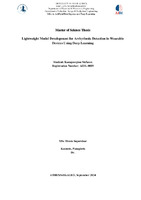Lightweight model development for arrhythmia detection in wearable devices using deep learning
Ανάπτυξη ελαφρού μοντέλου για την ανίχνευση αρρυθμιών σε φορετές συσκευές με τη χρήση βαθιάς μάθησης

Μεταπτυχιακή διπλωματική εργασία
Συγγραφέας
Καραγεωργίου, Στέφανος
Ημερομηνία
2024-10-16Επιβλέπων
Kasnesis, PanagiotisΛέξεις-κλειδιά
Deep learning ; Arrhythmia detection ; Wearable medical devices ; ECG classification ; Real-time prediction ; Ηλεκτροκαρδιογράφημα ; Αρρυθμίες ; Φορετές συσκευές ; Βαθιά μάθησηΠερίληψη
Cardiac arrhythmias are a common cause of morbidity and mortality worldwide. The early diagnosis and prompt treatment of cardiac arrhythmias can improve patient outcomes and prevent adverse events such as stroke and sudden cardiac death. Electrocardiogram (ECG) monitoring has been widely used to diagnose cardiac arrhythmias, but the manual interpretation of ECGs can be time- consuming and require specialized training. The increasing availability and affordability of wearable devices with ECG monitoring capabilities provide an opportunity to improve the detection and diagnosis of cardiac arrhythmias. Therefore, for my thesis, I propose to develop a lightweight model for real-time arrhythmia detection that can be used in wearable devices. Over the last decade, many machine learning and deep learning (DL) models have been developed for the automatic detection and classification of cardiac abnormalities, including arrhythmias. Several studies have shown that these models can achieve high accuracy in detecting arrhythmias from ECG recordings. However, most of these DL-based models are computationally expensive and have very complex architectures, hence requiring high-end hardware, which limits their applicability in lightweight wearable devices. Some of those architectures include multi-head attention transformers and pre-trained convolutional neural networks. Although these models have significant predictive power, their prediction time increases exponentially making the prediction time longer and not suitable for real-time predictions. To this end, a CNN model for arrhythmia detection will be developed that is going to be lightweight and suitable for deployment in wearable devices. The model will be trained on the 2020 PhysioNet Challenge dataset [1], which includes 12-lead ECG recordings from patients with different cardiac conditions. The performance of the developed model will be compared to existing methods for arrhythmia detection, including traditional machine learning and deep learning models. One of the focuses of this thesis will be “knowledge distillation”, a technique that uses the predictions of a complex model to train a lightweight model. Different CNN architectures and hyperparameters will be explored to optimize the model's performance while keeping it lightweight.
Αριθμός σελίδων
72Σχολή
Σχολή ΜηχανικώνΑκαδημαϊκό Τμήμα
Τμήμα Ηλεκτρολόγων και Ηλεκτρονικών ΜηχανικώνΤμήμα Μηχανικών Βιομηχανικής Σχεδίασης και Παραγωγής

